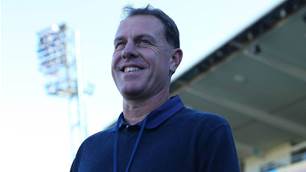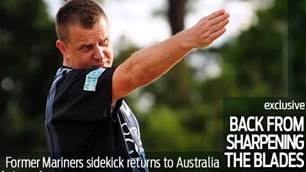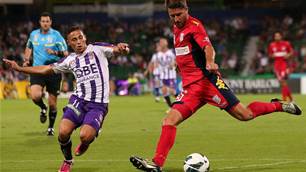MELBOURNE-born former EPL left-back Tony Dorigo on not playing for the Socceroos.
That year would also signal the opportunity for Dorigo to do what no Aussie could since 1974 – play at a World Cup. “I remember Australia playing in the Germany 1974 World Cup, which was incredible, but it had been so many years since Australia had made it.
“So getting to play at Italia 90 was an amazing experience, but also quite surreal as my father is Italian. We played against Italy in the third place play-off too and I even set-up our goal, but we lost 2-1. When I came off my father said ‘that game was perfect’, I said: ‘we lost and Italy won’ and he said ‘exactly!’ He was pleased that I had played well at least.”
That play-off took place after England had lost their semi-final against Germany on penalties. That was England’s best World Cup performance since their 1966 victory, and remains their best effort today. Also playing for England in that tournament was the enigmatic, superbly talented and all-round joker Paul “Gazza” Gascoigne. Most England players of that era have a Gazza story.
“One Gazza story? I’ve probably got 100 of them,” says Dorigo. “I was his captain for England U21s, I went on an England B tour with him and we both went to Italia 90. I roomed with him once and refused to room with him again. He just won’t sit still or even go to sleep – he has to be doing something. He was always more comfortable playing football. One of the craziest things he did was when we were up in Turin preparing for the World Cup semi-final the day before the game against Germany. We trained in the morning, had lunch and then coach Bobby Robson told us to rest up in our rooms during the afternoon and stay out of the sun, which was scorching. Apparently Gazza went outside in the afternoon playing tennis! He managed to find a German guy who he challenged to a game of tennis. When Robson found him, the score was one set all and Gazza was adamant that he wanted to play the deciding third set. The next day was the World Cup semi-final!”
Gazza’s lunacy and a very commendable tournament result aside, Dorigo would spend only one more year at Chelsea before seeking new, more successful, pastures as he inked a 1991 deal to join Leeds United. “The whole town is football nuts,” says Dorigo of Leeds. “That first year I was there we won the title – it was a great side. We probably used the same eleven every week. We were not the most fancy squad – even then it was Manchester United or Liverpool – but as a team we worked well. We went away to Sheffield Wednesday, who finished third that season, and won 6-1. We could not do anything wrong, then the following year we struggled to do anything right.”
The following campaign, Dorigo notes, resulted in the champions finishing a pitiful 17th, “we just could not win a game away from home. We did manage to play in Europe though”. Dorigo persevered at Leeds for another five years, making it the club he played for the most, before he made his father proud with a 1997 move to Torino in Italy.
“It was fantastic in Italy, I would have loved to have experienced that earlier in my career. I was in my early 30s by then and was carrying a few injuries, so I was past my best. The lifestyle was wonderful. The style they played suited me too”. Unfortunately contractual and money issues halted Dorigo’s Italian foray and he returned to England just a year later to join Derby County. During that one season at Torino, Dorigo was awarded the club’s Player of the Year award, an accolade he received at every single one of his prior clubs – Aston Villa, Chelsea and Leeds. Few Aussies can boast such broad and lengthy consistency from their European career.
At Derby, Dorigo extended his career at an arguably overachieving Premier League side. “We had some good players and finished in the top half of the Premier League,” says Dorigo. “It was a great club, but it was the first club I went to that did not look to win things – which I found odd. Derby might look at fixtures and say ‘okay, we might lose that one and that one, we will draw that one, but we have to win those two’. I had never thought like that. Every club I had been at before had wanted to win the league. I would have liked to have finished my career there actually. They agreed to another year, but went back on their word.”
Dorigo then turned to the lower leagues of English football and engineered a move to Stoke City to see out his career. “Stoke really wanted to sign me and that endeavour got me there,” says Dorigo. “Dropping down a couple of divisions was tough though, more so in terms of the players I was playing with. I know I was there to lift the level, but it was tough. We ended up losing in the promotion play-offs.”
In 2001, Dorigo retried from the game after six clubs, a league title, a cup final victory, a World Cup Finals appearance, several Player of the Year gongs and a good spread of goals for a left-back – including several cracking free-kicks. An online Leeds United fans’ poll placed Dorigo as the club’s 18th greatest ever player, ahead of both Mark Viduka and Harry Kewell.
After spending the last six years developing property in Portugal’s Algarve, Dorigo is back in England doing media work and running his own sports agency called Renegade Sports Group (www.renegadesports.tv). “We manage a few players and are always looking for Aussie players to come through”. If he’s half as good an agent as he was footballer, we would recommend his services without a moment’s hesitation.
This article appeared in the December 2011 issue of Australian FourFourTwo magazine. To buy back copies of this issue call 03-8317-8121 with a credit card to hand.
The current edition of Australian FourFourTwo has just gone on sale in newsagent across the country, or you can subscribe here
Related Articles

The Best and Worst of Mariners vs Adelaide

Walmsley back from sharpening Blades













